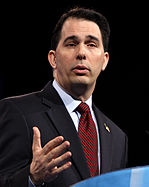Wisconsin gubernatorial recall election, 2012
|
|
|||||||||||||||||
|---|---|---|---|---|---|---|---|---|---|---|---|---|---|---|---|---|---|
|
|||||||||||||||||
|
|||||||||||||||||

Results by county
|
|||||||||||||||||
|
|||||||||||||||||
The 2012 Wisconsin gubernatorial election were recall elections to elect the governor and lieutenant governor of Wisconsin. It resulted in voters re-electing incumbent Republican Governor Scott Walker over the Democratic candidate Tom Barrett by a larger margin than he had in 2010, in which Walker had also faced Barrett. Recall organizers opposed Walker's agenda, particularly his limiting of collective bargaining privileges for state employees and they collected over 900,000 signatures to initiate the recall election process. There was also a recall for Lieutenant Governor Rebecca Kleefisch. She won her race, defeating Democrat Mahlon Mitchell, making her the first lieutenant governor to run in and survive a recall.
The Democratic primaries took place on May 8. The recall elections were held June 5 with Walker defeating Barrett. Walker was thus the first U.S. governor to continue in office after facing a recall election.
Four state senate recall elections took place the same day as the gubernatorial recall elections, resulting in two wins by Republican incumbents, one open seat win by a Republican, and one win by a Democratic challenger, giving Democrats control of the state Senate.
The recall election was just the third gubernatorial recall election in U.S. history and the only one in which the incumbent was not defeated. The other governors who were subject to a recall election were Lynn Frazier of North Dakota (1921) and Gray Davis of California (2003).
...
Wikipedia


